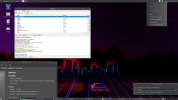This isn't comparable to commercial vs civilian airplanes, which their frame limits what can be put on it. Software has limits, but not those kinds of limits. In software (an extreme example is the case of SystemD), a lot of limits are self imposed. A lot of other self imposed limits are that it takes a good plan and structure from the beginning.
As for desktop, JWM was good and fast at some point, but later on, more features were made into the default and it slowed down my laptop. I switched to MCWM, while it's not as convenient, it gets the job done. Before, I had a lot in mind for desktop applications, but reducing it to basic wants, I'd want to see or port a few desktop applications to XCB, and leave the rest to what it is. Desktop applications I'd like to port, or see xcb clones of would be: osdmixer, a volume mixer like gvolwheel, a tray like stalonetray, and anything that sets basic desktop needs like the background. Also, improved functionality of the xcb terminal emulator jbxvt, an improvement or a replacement. I've noticed that a few XCB programs make calls to traditional xlib, so they're actually not completed projects to the name, and some XCB programs have bugs. Eventually, there could be xcb clones of Window Maker applications, but that would be a whole other project.
As for a vision, a separate project of a repository of retro game clones and emulators, with each category by the gaming generation or near equivalent. Though, that wouldn't only be a FreeBSD project, it would be a FreeDOS, PDOS and other BSD project as well. If I had the ability, I'd pay to have a project to get that done, even though there's similar websites, they're not categorized by generation style, and this would be more specific to ports and packages of multiple specific operating systems. So, I'm dreaming about this one.

